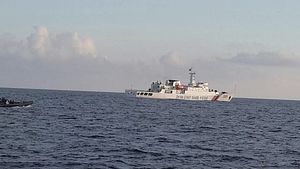Earlier this week, a top Indonesian official made headlines when he said that Indonesia planned to establish a fishing zone in waters north of the Natuna Islands to preserve the country’s interests there. Though the statement constitutes a reinforcement of preexisting efforts by Jakarta in this respect, it has nonetheless spotlighted the Southeast Asian state’s ongoing efforts in this respect as the country heads into elections in April this year.
As I have noted before in these pages and elsewhere, Indonesia’s resource-rich Natuna Islands, located in the South China Sea northwest of Borneo, have long factored into the country’s broader calculations in several senses, including the development of its energy resources, the promotion of its fishing industry, and the preservation of its position in the South China Sea (though Jakarta maintains that it is officially not a claimant). Over the last few years under Indonesian President Joko “Jokowi” Widodo, as manifested in various aspects of policy including the crackdown on illegal fishing vessels, confronting Chinese vessels infringing into Indonesia’s waters, pushing for more energy resource development, and upgrading basing and other security facilities (See: “What’s in the New Indonesia South China Sea Base Hype?”).
One aspect of Indonesia’s approach has been the construction of several marine and fishery facilities across the sprawling archipelago, including around the Natunas. The building of the facilities, which were initially expected to become operational by 2020, were framed primarily as ways to boost the capabilities of local fishermen to increase their catch, thereby strengthening Indonesia’s fishing industry, which has been a target of the Jokowi administration (to date, despite some advances made, fishery catches are still below the government’s targets).
Indonesia’s efforts in this realm have continued on over the past year or two, despite the fact that they only get an occasional mention in the headlines. One high-profile development came last year, when Japan’s role in helping Indonesia construct these facilities was episodically in the spotlight during the summer with the Japan International Cooperation Agency (JICA) providing funding for facilities including in Natuna, such as upgraded fishing ports and storage centers.
This week, Indonesia’s approach to the South China Sea was in the headlines again with talk of a new fishing zone being opened. Reports cited Coordinating Minister for Maritime Affairs Luhut Pandjaitan as telling a press conference that a fishing zone would be opened in the Natuna Sea, a section of the South China Sea that is within Indonesia’s exclusive economic zone (EEZ) but which China still claims as part of its traditional fishing grounds.
Pandjaitan noted that a fishing zone would be opened in the third quarter of this year, and that it would include several facilities including a fish market, a cold storage and a fish processing center, and other structures including a potential boarding house for fishermen. With his characteristic bluntness, Pandjaitan also reflected more broadly on the value of these new facilities with respect to Indonesia’s overall capabilities relative to China, noting indirectly that with Indonesia possessing things such as a tanker ship to supply fuel for fishermen as well as more naval patrol boats, “there will be no countries who claim that the zone is their traditional fishing grounds.”
As suggested earlier, while this development may seem new and headline-grabbing, developing facilities including a fishing zone has in fact long been part of Indonesia’s overall approach and has been underway. Pandjaitan’s highlighting of it merely reinforces the fact that such work continues to be actively underway, and that there are various motives behind it including geopolitical ones. His choice to highlight the geopolitical aspect of it, while not surprising, is nonetheless interesting given the fact that we are weeks away from Indonesia’s upcoming elections, where the Jokowi administration’s approach to preserving Indonesia’s sovereignty and territorial integrity and manage ties with major powers such as China are among the long list of issues.
It is difficult to comprehensively evaluate the significance of a fishing zone given the limited information disclosed so far. While the facilities such as fuel tankers, sea ports, and cold storage facilities would certainly represent a boost for Indonesia’s fishermen and its fishing industry, it is unclear how much of a boost this would be and whether these steps would be sufficient to close the vast capability gaps that the country’s fishermen still have. There are also other factors that play into the effectiveness of this move, including the sustainability of the government’s ongoing campaign against illegal fishing, the willingness of other countries including China to respect it, and other efforts underway to reform how the Indonesian fishing industry itself works.
More generally, as I have noted with respect to other ad hoc developments, such individual inroads ought to be assessed as part of Indonesia’s wider approach to its maritime challenges across the country as they are conceived, rather than from the perspective of a single development in one designated flashpoint for its own sake, which is far too often the case. Nonetheless, given developments in the South China Sea as well as the continued attention to related maritime efforts by regional players such as Indonesia, one can expect attention to aspects such as new fishing zones to continue be a key area of international focus.
































